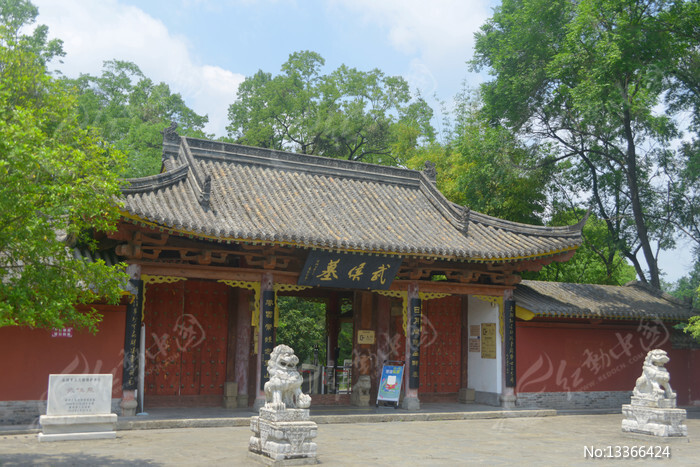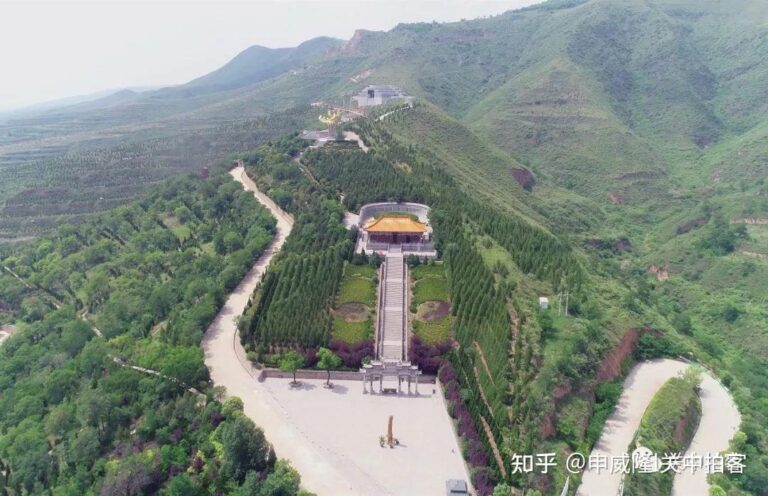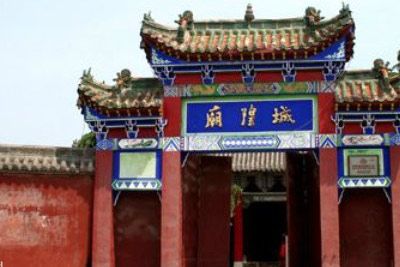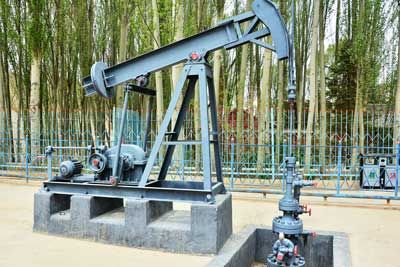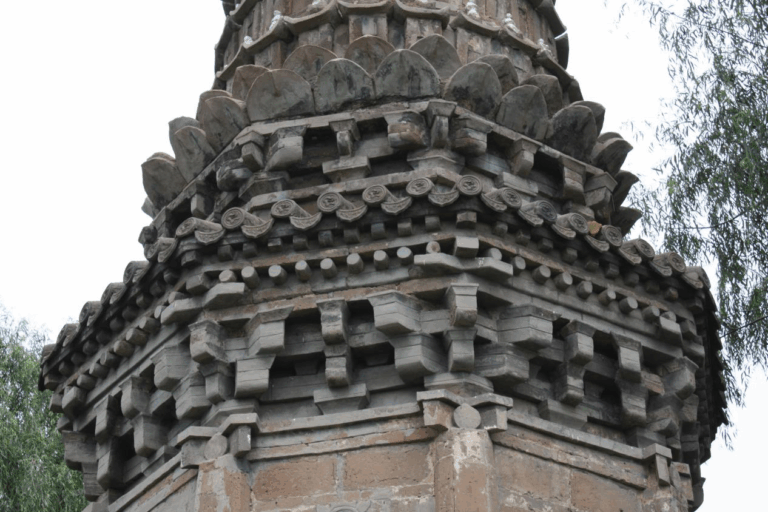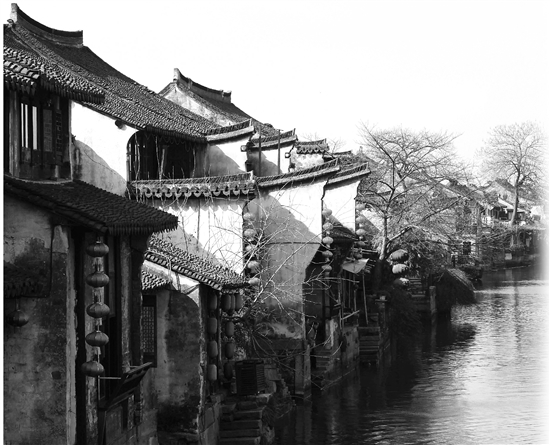Experience Spiritual Bliss at Chizhou Jiuhuashan Yueshendian: A Must-Visit Destination in Anhui
An Essential Guide to Visiting Chizhou Jiuhuashan Yueshendian
In This Guide
- An Essential Guide to Visiting Chizhou Jiuhuashan Yueshendian
- The Rich History of Chizhou Jiuhuashan Yueshendian
- Main Highlights: What to See at Chizhou Jiuhuashan Yueshendian
- Planning Your Visit: A Practical Guide
- Tickets, Hours, and Booking
- How to Get There
- Local Cuisine and Accommodation
- Frequently Asked Questions
- Final Thoughts on Your Trip
Nestled within the breathtaking landscapes of Anhui Province, Chizhou Jiuhuashan Yueshendian, or the Flesh Body Hall, stands as a testament to the rich spiritual heritage of Buddhism in China. As one of the four sacred Buddhist mountains, Jiuhua Mountain attracts countless pilgrims and travelers alike, drawn not only by its stunning natural beauty but also by its profound historical significance.
The Flesh Body Hall, a remarkable architectural marvel, is revered as the final resting place of the esteemed monk Jizang, also known as Kṣitigarbha Bodhisattva. This sacred site is unique as it houses the preserved physical body of the monk, making it a focal point for those seeking spiritual solace and enlightenment. The hall’s intricate design, featuring a wooden pagoda-like structure, embodies a harmonious blend of traditional Chinese artistry and solemnity, inviting visitors to reflect on the profound teachings of Buddhism.
Visitors to Jiuhuashan can expect a journey filled with serene landscapes, ancient temples, and a vibrant atmosphere steeped in religious significance. Whether you come to pay your respects, explore the lush surroundings, or simply absorb the tranquility of this holy site, the Flesh Body Hall offers a unique opportunity to connect with a culture that has thrived for centuries. Prepare to embark on an enlightening adventure where spirituality and nature intertwine, creating a destination unlike any other.
The Rich History of Chizhou Jiuhuashan Yueshendian
Nestled in the scenic Jiuhua Mountain in Anhui Province, Chizhou Jiuhuashan Yueshendian, or the Bodhisattva Hall, has a rich and storied history that dates back to the Tang Dynasty. Originally constructed during the Zhenyuan period (785-804 AD), this sacred site has undergone numerous reconstructions throughout the centuries, often due to natural disasters and the passage of time.
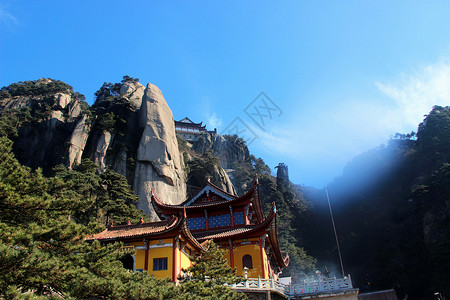
Chizhou Jiuhuashan Yueshendian.
The hall is highly revered as it serves as the final resting place of the eminent monk Jinjiao Jue, recognized as the earthly incarnation of Ksitigarbha Bodhisattva. According to Buddhist tradition, upon his death, the monk’s body was placed in a vat for preservation. Three years later, the monks of the temple constructed a pagoda around the vat, which ultimately led to the establishment of the Bodhisattva Hall. This unique architectural arrangement—a hall that houses a pagoda, which in turn contains the vat with the monk’s body—embodies profound spiritual significance and draws countless visitors each year.
Today, Chizhou Jiuhuashan Yueshendian stands as a focal point of Buddhism in China, attracting pilgrims and tourists alike who seek to pay their respects and absorb the serene atmosphere. The hall is not just a site of worship; it is a testament to the enduring legacy of Buddhist culture in this region. The continuous flow of incense and prayers reflects the site’s ongoing significance and the deep reverence that generations have held for Jinjiao Jue and his teachings.
As one explores the tranquil grounds of Jiuhua Mountain, the Bodhisattva Hall remains a poignant reminder of the intertwining of faith and history, inviting visitors to reflect on the spiritual journey and the rich heritage of this sacred mountain.
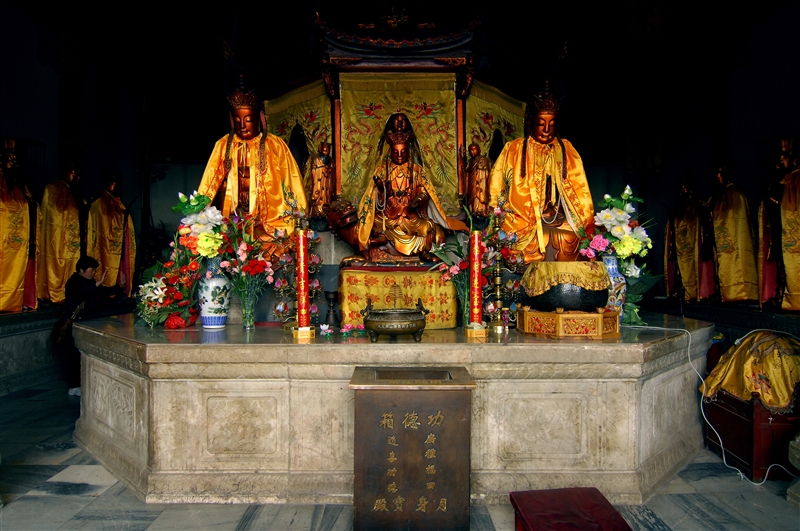
Chizhou Jiuhuashan Yueshendian.
Main Highlights: What to See at Chizhou Jiuhuashan Yueshendian
Nestled in the picturesque mountains of Anhui Province, Chizhou’s Jiuhuashan Yueshendian, or the Flesh-body Hall, is a sacred site that stands as a testament to China’s rich Buddhist heritage. Established during the Tang Dynasty, this architectural marvel has undergone numerous reconstructions due to natural calamities, yet its allure remains undiminished. Here are the key highlights that make this site a must-visit for both pilgrims and tourists alike:
Historic Significance
The Flesh-body Hall is renowned as the final resting place of the revered monk Jinzhao Jue (Ksitigarbha Bodhisattva), whose body is preserved within a vat, symbolizing the profound beliefs of Buddhism regarding life, death, and the afterlife. Visitors often feel a deep sense of reverence upon entering this hallowed space, where the atmosphere is charged with spiritual energy.
Architectural Marvel
The hall’s unique structure is a blend of a pagoda and a temple, encapsulating the essence of Buddhist architecture. It features intricate wooden carvings and serene aesthetics that invite contemplation. The design is particularly striking as it accommodates a tower within a hall, and a vat within the tower, making it a remarkable architectural feat that draws admiration from all who visit.
Spiritual Retreat
For those seeking peace and tranquility, the Flesh-body Hall offers an environment steeped in serenity. Visitors are encouraged to engage in prayer and meditation, surrounded by the soft sound of incense wafting through the air. The hall is often bustling with devotees, creating a vibrant atmosphere of faith and devotion.
Scenic Surroundings
Located within the stunning Jiuhuashan Scenic Area, the Flesh-body Hall is surrounded by lush mountains and beautiful landscapes, making it an excellent spot for nature lovers. The area features numerous hiking trails, allowing for a harmonious blend of spiritual exploration and outdoor adventure. The views from the nearby peaks are breathtaking, especially during sunrise and sunset, when the mountains are bathed in golden light.
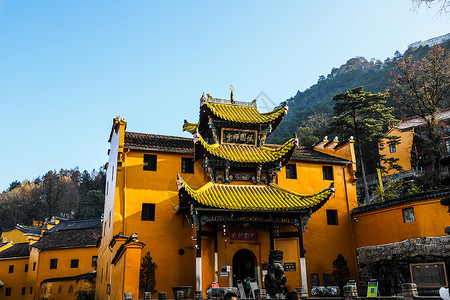
Chizhou Jiuhuashan Yueshendian.
Accessibility and Visitor Experience
The Flesh-body Hall is easily accessible from the main entrance of Jiuhuashan, with clear signage and well-maintained paths leading to the site. Visitors typically spend 1-2 hours here, allowing ample time to explore the hall, participate in rituals, and absorb the tranquil ambiance. Admission is free, making it an inviting destination for everyone.
Culinary Delights
No visit to Jiuhuashan would be complete without indulging in the local vegetarian cuisine, known for its health benefits and unique flavors. The area is famous for dishes such as vegetarian chicken and duck, offering a delightful culinary experience that aligns with the region’s Buddhist heritage.
In summary, Chizhou’s Jiuhuashan Yueshendian is not just a site of worship but a multifaceted destination that encapsulates history, culture, and natural beauty. Whether you are on a spiritual journey or simply looking to explore the wonders of this ancient land, the Flesh-body Hall promises an enriching experience that resonates long after your visit.
Planning Your Visit: A Practical Guide
Practical Guide to Visiting Chizhou Jiuhuashan Yueshendian (九华山月身殿)
Visiting Chizhou Jiuhuashan Yueshendian, also known as the Flesh Body Hall, is a unique experience steeped in rich Buddhist culture and history. Here’s a practical guide to help you navigate this sacred site effectively.
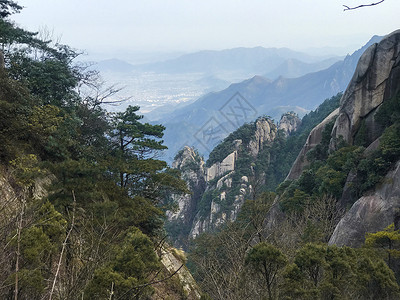
Chizhou Jiuhuashan Yueshendian.
Getting There
By Air: The closest airport is Chizhou Jiuhuashan Airport, situated approximately 30 kilometers from the Jiuhuashan scenic area. From the airport, you can take a bus or taxi to reach your destination.
By Train: High-speed trains run to Chizhou Station or Tongling North Station. From either station, local buses or taxis can take you to Jiuhuashan, with an estimated travel time of about an hour.
By Car: If you prefer driving, the area is accessible via the G3 Beijing-Taipei Expressway or the G50 Shanghai-Chongqing Expressway. Ample parking is available within the scenic area.
Admission
Entry to the Flesh Body Hall is free, allowing visitors to explore this significant site without the burden of admission fees. However, it’s advisable to check for any specific visitor guidelines or requirements prior to your visit.
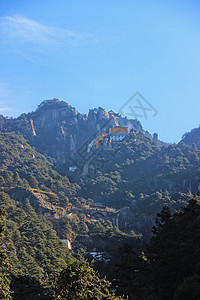
Chizhou Jiuhuashan Yueshendian.
Recommended Visiting Time
Plan to spend around 1 to 2 hours at the Flesh Body Hall. This duration allows enough time to appreciate the architectural beauty, engage with the spiritual atmosphere, and partake in any rituals, such as lighting incense.
Key Attractions Nearby
-
Tiantai Temple (天台寺): Located at the highest peak of Jiuhuashan, this temple offers stunning views and is a must-visit for its serene environment.
-
Huacheng Temple (化城寺): As the founding temple of Jiuhuashan, it’s rich in history and contains numerous Buddhist relics.
-
Baisui Palace (百岁宫): This site houses the remains of the eminent monk Haiyu and features unique architectural styles.
-
Floral Terrace Scenic Area (花台景区): Perfect for nature lovers, this area is known for its beautiful springtime blossoms and autumn foliage.
Accommodation Options
-
Jiuhua Street: This area offers a wide range of lodging options, from budget hostels to luxury hotels, catering to various budgets.
-
Mountain Temples: Some temples provide accommodation, allowing visitors to immerse themselves in the Buddhist culture. Reservations are required in advance.
-
Qingyang County: Located at the foot of the mountain, this area offers more affordable lodging options, making it suitable for those traveling by car.
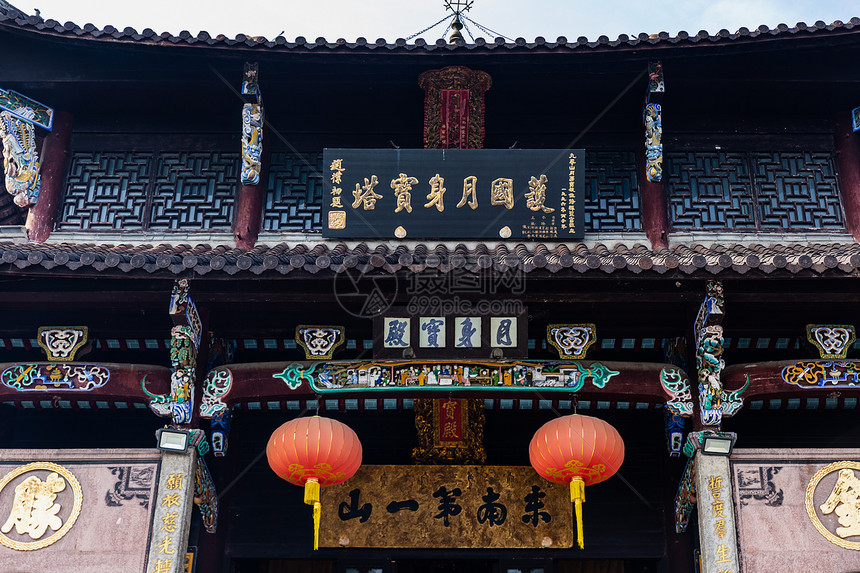
Chizhou Jiuhuashan Yueshendian.
Culinary Delights
-
Jiuhua Vegetarian Cuisine: Renowned for its light and healthy dishes, be sure to try the vegetarian chicken, duck, and ham.
-
Qingyang Potstickers (青阳锅贴): A local delicacy with a crispy exterior and delicious filling.
-
Stone Ear Chicken (石耳炖鸡): A nourishing dish made with local stone ear mushrooms, perfect for re-energizing after a hike.
Tips for Visitors
-
Dress Appropriately: Given the high altitude, temperatures can be cooler. Bring warm clothing, especially for early mornings and evenings.
-
Footwear: Comfortable walking shoes are essential for exploring the area and hiking to various temples.
-
Respectful Behavior: As Jiuhuashan is a sacred Buddhist site, visitors are expected to maintain silence and respect religious customs while in temples.
-
Environmental Awareness: Littering is prohibited. Carry a reusable bag for any waste to help keep the area pristine.
Best Time to Visit
Jiuhuashan is beautiful year-round. Spring and autumn offer pleasant weather ideal for hiking and sightseeing. Summer provides a cool retreat, while winter boasts stunning snow-covered landscapes.
Suggested Itinerary
- One-Day Tour:
- Morning: Visit Huacheng Temple
- Afternoon: Explore the Flesh Body Hall and Baisui Palace
-
Evening: Hike to Tiantai Temple for sunset views.
-
Two-Day Tour:
- Day 1: Explore Jiuhua Street and visit nearby temples.
- Day 2: Spend the day hiking and enjoying nature at the Floral Terrace Scenic Area.
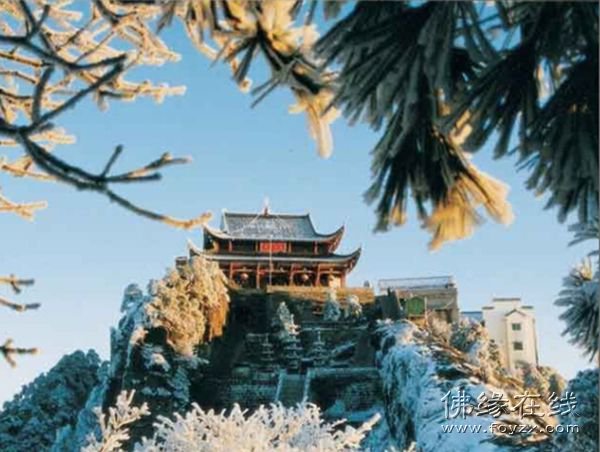
Chizhou Jiuhuashan Yueshendian.
This guide should help you navigate the spiritual and natural beauty of Jiuhuashan with ease. May your visit be enriching and fulfilling!
Tickets, Hours, and Booking
When planning your visit to Chizhou Jiuhuashan Yueshendian, it’s important to understand the ticketing details to make your experience as smooth as possible.
Admission Fees
Entry to the Yueshendian, also known as the Flesh Body Hall, is free of charge. This allows visitors to explore the sacred site without worrying about ticket costs.
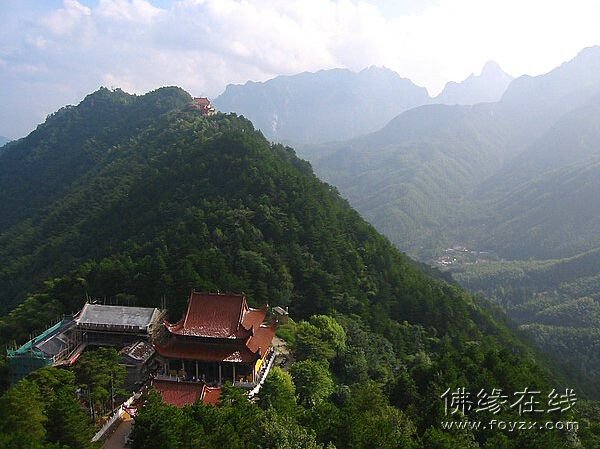
Chizhou Jiuhuashan Yueshendian.
Seasonal Variations
While the Yueshendian itself does not require an admission fee, the broader Jiuhuashan scenic area does have a ticketing system based on the season:
- Peak Season (January 16 – November 14): Entrance fee is 160 CNY per person.
- Off-Peak Season (November 15 – January 15): The fee is reduced to 140 CNY per person.
Transportation and Additional Costs
If you plan to use the cable cars to access various scenic spots within Jiuhuashan, please note the additional charges:
– Huatai Cable Car: 160 CNY round trip
– Baisui Palace Cable Car: 100 CNY round trip
– Tiantai Cable Car: 160 CNY round trip
Tips for Your Visit
- Purchase Tickets in Advance: If you’re visiting during peak season, consider buying your tickets online or at designated booths to avoid long lines.
- Check Operating Hours: While the Yueshendian is open for visits throughout the day, other attractions may have specific hours, so verify before your trip.
- Respect the Sacred Space: As a site of worship, maintain a respectful demeanor during your visit, and adhere to any guidelines provided on-site.
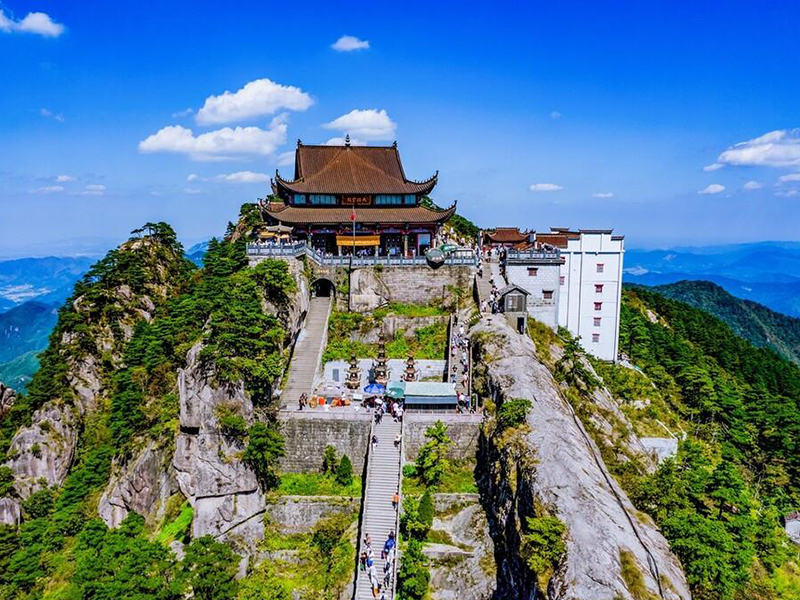
Chizhou Jiuhuashan Yueshendian.
By keeping these ticketing details in mind, you can ensure a rewarding and enriching visit to the Chizhou Jiuhuashan Yueshendian. Enjoy your spiritual journey!
How to Get There
When planning your visit to Chizhou Jiuhuashan Yueshendian (肉身宝殿), also known as the Bodhi Palace or the Hall of the Flesh Body, it’s essential to consider the various transportation options available to reach this sacred site. Located in the picturesque Jiuhua Mountain area of Chizhou City, Anhui Province, this destination is well-connected by several modes of transport, ensuring a smooth journey for travelers.
By Air
The nearest airport is Chizhou Jiuhuashan Airport, situated approximately 30 kilometers from the Jiuhuashan scenic area. Daily flights connect this airport with major cities such as Beijing and Shanghai. Upon arrival, you can take a taxi or shuttle bus directly to Jiuhuashan, making it a convenient option for air travelers.
By High-Speed Rail
For those preferring rail travel, the high-speed rail network in China provides an efficient option. You can take a high-speed train to either Chizhou Railway Station or Tongling North Railway Station. From either station, local buses and taxis are readily available to take you to Jiuhuashan. The ride from the station to the mountain typically takes about an hour.
By Car
Driving is another practical way to reach Jiuhuashan, especially for those who wish to explore the surrounding areas at their own pace. The scenic area is accessible via major highways:
– If you’re coming from Hefei, take the G3 Jing-Tai Expressway.
– From Nanjing, you can use the G50 Huh-Chong Expressway.
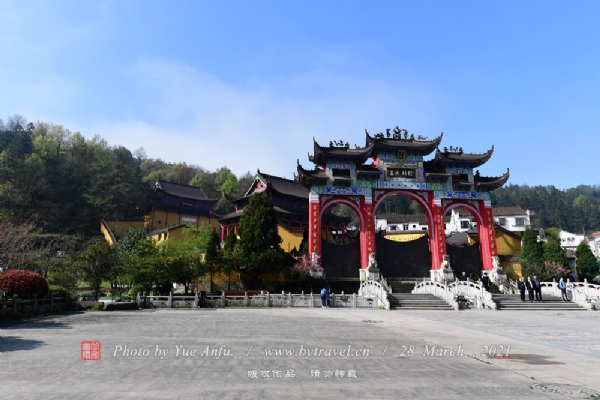
Chizhou Jiuhuashan Yueshendian.
Once you arrive, there are parking facilities available within the scenic area for your convenience.
Public Transportation
Local buses operate regularly from Chizhou’s city center to Jiuhuashan, providing an economical way to reach the area. The shuttle buses from the bus terminal offer a direct route to the mountain, with a travel time of about 40 minutes. This option is ideal for budget-conscious travelers or those looking to experience local transport.
Tips for Travelers
- Plan Ahead: Given the variety of transportation options, consider your arrival time and choose the method that best fits your schedule.
- Check Schedules: If using public transport, verify bus and train schedules in advance, especially during peak travel seasons or holidays.
- Stay Connected: For ease of navigation, consider purchasing a local SIM card or eSIM that provides data for maps and transportation apps.
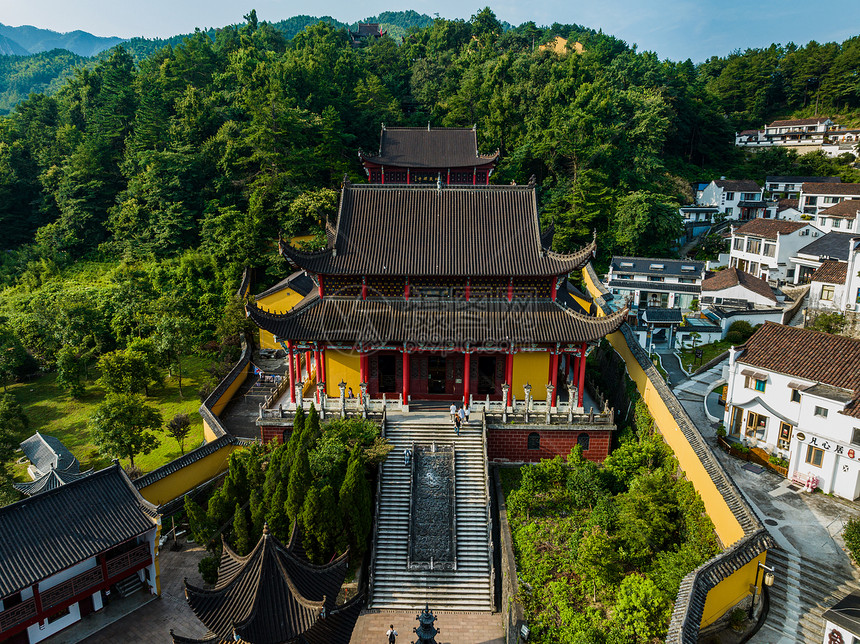
Chizhou Jiuhuashan Yueshendian.
With these transportation options, accessing Chizhou Jiuhuashan Yueshendian is straightforward, allowing you to focus on enjoying the spiritual and natural beauty of this revered site. Safe travels!
Local Cuisine and Accommodation
When visiting Chizhou Jiuhuashan Yueshendian (九华山月身殿), a blend of spiritual exploration and culinary delights awaits you. This sacred site, nestled in the picturesque surroundings of Jiuhuashan, offers various options for accommodation and food that enhance your experience.
Accommodation Options
- Hotels Near Jiuhuashan Scenic Area:
- JiuHua Mountain Hotel: Located conveniently close to the main attractions, this hotel provides comfortable rooms equipped with modern amenities. Its restaurant serves a mix of local and traditional Chinese cuisine, making it a great choice for travelers seeking convenience and comfort.
-
Tongjiang Wanxin Hotel: This establishment offers a more luxurious experience with spacious rooms and beautiful views of the surrounding mountains. Guests can enjoy a relaxing stay with access to spa services and fine dining options.
-
Guesthouses and Inns:
- Traditional Courtyard Inns: For a more authentic experience, consider staying at one of the courtyard-style guesthouses in the area. These charming accommodations feature traditional architecture, lush gardens, and cozy interiors. Many of these inns provide a peaceful retreat away from the bustle of city life, allowing you to immerse yourself in the serene atmosphere.
-
Buddhist Temples: Some temples in the area offer lodging for those interested in experiencing monastic life. Reservations are recommended, and staying here provides a unique opportunity to engage in meditation and enjoy the tranquil surroundings.
-
Budget Options:
- Hostels: If you’re on a budget, several hostels in the vicinity offer affordable dormitory-style accommodations. These places are perfect for solo travelers or backpackers looking for a social atmosphere.
Culinary Delights
- Vegetarian Cuisine:
-
Jiuhuashan Vegetarian Dishes: The region is famous for its Buddhist-inspired vegetarian cuisine, which emphasizes fresh, healthy ingredients. Must-try dishes include vegetarian chicken, duck, and ham, all made from plant-based ingredients. Rest assured, these dishes are not only flavorful but also a healthier alternative.
-
Local Snacks:
- Qingyang Potstickers: A local specialty, these potstickers are crispy on the outside and filled with a savory mixture of vegetables and spices. They make for a perfect snack while exploring the area.
-
Stone Ear Chicken Soup: Made with a unique local fungus known as stone ear, this nourishing chicken soup is a must-try. It’s not only delicious but also provides a hearty boost after a day of hiking.
-
Dining Recommendations:
- Four Seasons Yongyi Hotel Restaurant: This hotel features a restaurant that offers a wide range of local dishes, including the famed Jiuhua vegetarian dishes and other regional delicacies. The ambiance is cozy, perfect for resting after a day of exploration.
-
Local Street Vendors: Don’t miss the chance to sample food from street vendors around Jiuhuashan. Here, you can find a variety of snacks and dishes at reasonable prices, allowing you to taste the local flavors without breaking the bank.
-
Dining Etiquette: While enjoying the local cuisine, keep in mind the cultural significance of food in this sacred area. It’s customary to eat mindfully and with respect, especially in vegetarian restaurants associated with Buddhist practices.
Whether you choose a tranquil temple stay or a comfortable hotel, along with the delightful local cuisine, your visit to Jiuhuashan will surely enrich your spiritual journey and culinary experience.
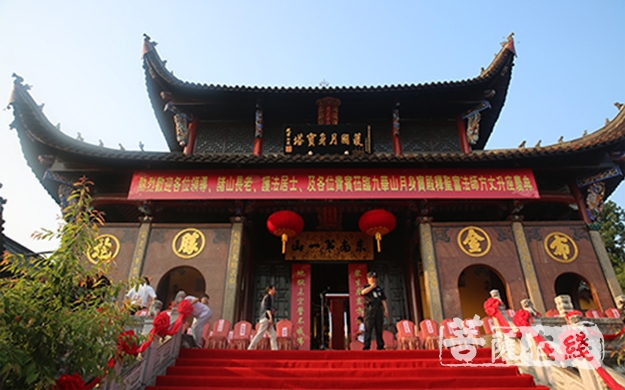
Chizhou Jiuhuashan Yueshendian.
Frequently Asked Questions
Frequently Asked Questions
1. What is the significance of Chizhou Jiuhuashan Yueshendian (肉身宝殿)?
Chizhou Jiuhuashan Yueshendian, also known as the Flesh Body Hall, is a revered Buddhist site where the physical remains of the monk Jinzhao are interred. It serves as a spiritual center for Buddhist pilgrims and visitors, reflecting the rich history and culture of Buddhism in China.
2. What are the operating hours for the Flesh Body Hall?
The Flesh Body Hall is open daily from 8:00 AM to 5:00 PM, allowing ample time for visitors to explore the sacred site.
3. Is there an entrance fee to visit the Flesh Body Hall?
Admission to the Flesh Body Hall is free, making it accessible for all visitors who wish to pay their respects and learn about its significance.
4. How do I get to Jiuhuashan from nearby cities?
The most convenient way to reach Jiuhuashan is by train or car. The nearest major transportation hubs are:
– Train: High-speed trains connect to Chizhou Station or Tongling North Station, followed by a bus or taxi to Jiuhuashan.
– Car: The area is accessible via the G3 Jing-Tai Expressway or the G50 Hu-Yu Expressway, with parking available at the scenic area.
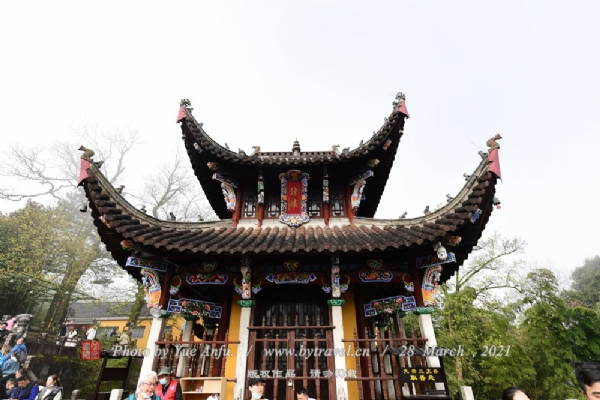
Chizhou Jiuhuashan Yueshendian.
5. What is the recommended time to explore the Flesh Body Hall?
Visitors should allocate approximately 1 to 2 hours to fully appreciate the architectural beauty and spiritual ambiance of the Flesh Body Hall, along with the surrounding area.
6. Are there other attractions near the Flesh Body Hall?
Yes, Jiuhuashan features several notable sites, including:
– Huacheng Temple: The oldest temple on the mountain, rich in history and artifacts.
– Baisheng Palace: Known for its scenic views and unique architecture.
– Tiantai Temple: Located at the highest peak, offering breathtaking views of the surroundings.
7. What should I wear when visiting the Flesh Body Hall?
Comfortable, modest clothing is recommended, as Jiuhuashan is a sacred site. It is also advisable to wear sturdy walking shoes, as some areas may require walking or climbing.
8. Is it necessary to follow any specific etiquette when visiting the Flesh Body Hall?
Yes, visitors should maintain a respectful demeanor, remain quiet, and follow traditional Buddhist practices while inside the hall. It’s important to observe local customs, such as not pointing at sacred images and refraining from loud conversations.
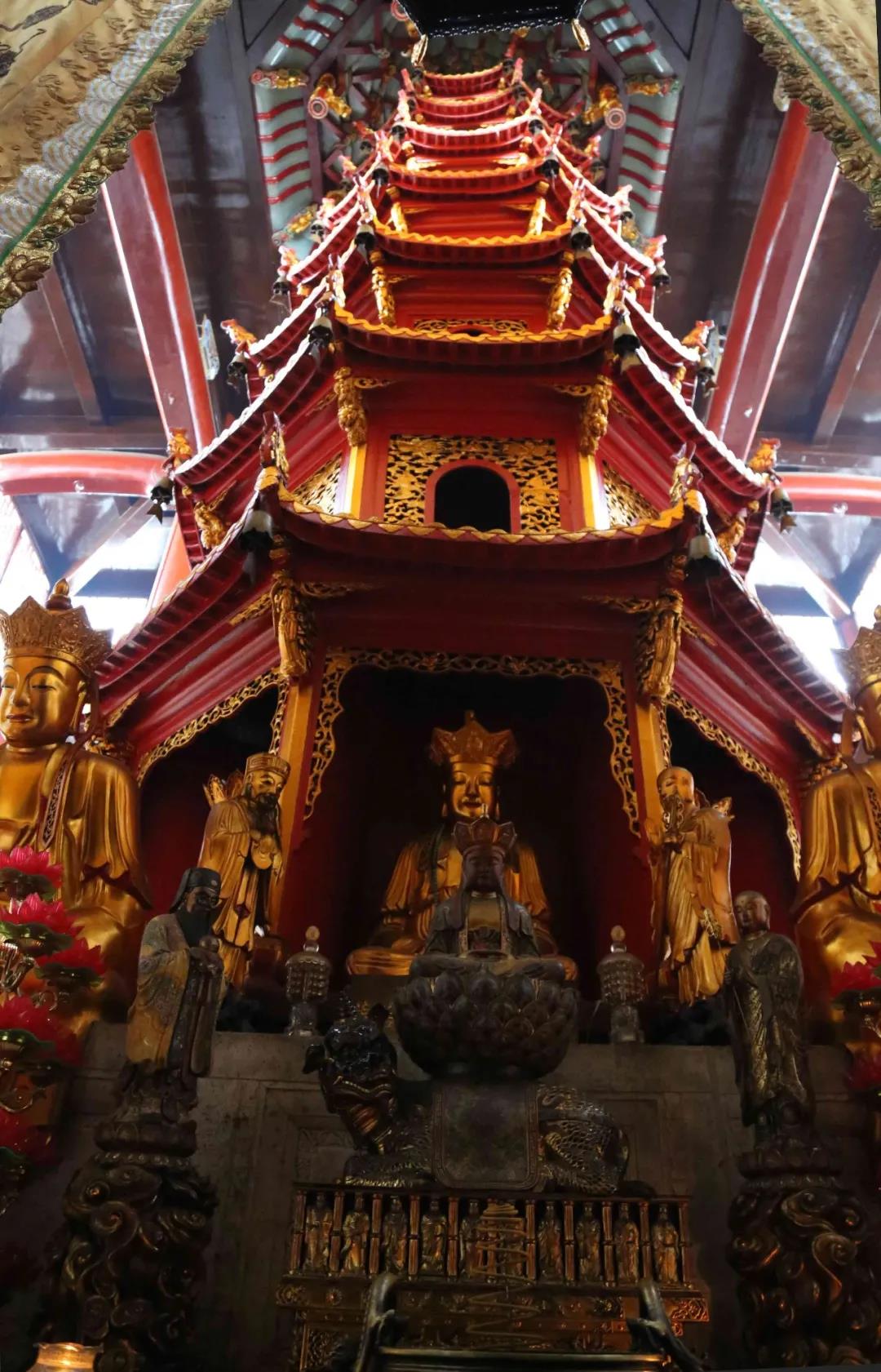
Chizhou Jiuhuashan Yueshendian.
Final Thoughts on Your Trip
In conclusion, a visit to Chizhou Jiuhuashan Yueshendian offers a profound journey into both the spiritual and natural realms. This sacred site, revered as a cornerstone of Buddhist culture, allows travelers not only to witness the architectural beauty of the temple but also to connect with a rich history that spans centuries. Whether you are seeking solace in the serene atmosphere, exploring the intricate details of the temple, or simply soaking in the breathtaking mountain landscapes, Jiuhuashan provides a unique blend of experiences that resonate deeply within the soul.
As you plan your journey, consider embracing the local customs and culinary delights, which enhance the overall experience. Engaging with the tranquil surroundings and the dedicated practices of those who visit for spiritual reasons can lead to moments of reflection and peace.
Ultimately, Jiuhuashan is more than a destination; it is an invitation to discover the harmony between nature and spirituality, making it a must-visit for adventurers and seekers alike. As you leave, carry with you not only memories of stunning vistas and sacred spaces but also a sense of inner calm and inspiration that will linger long after your visit.
